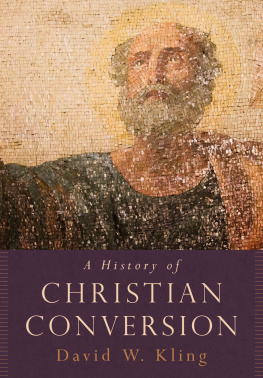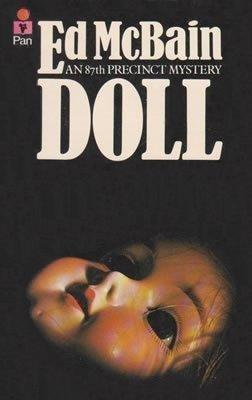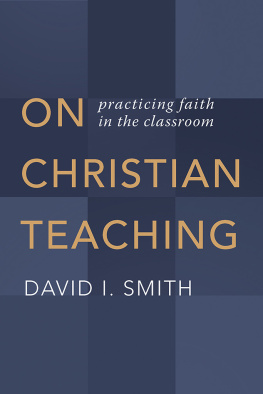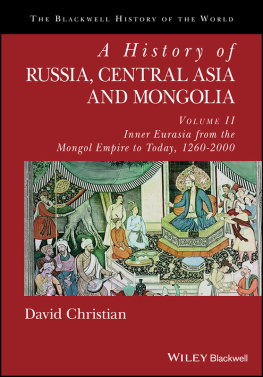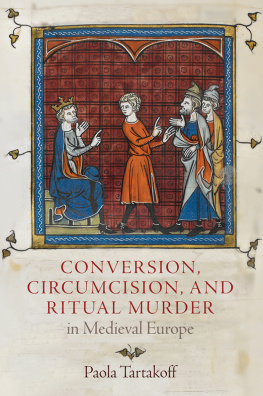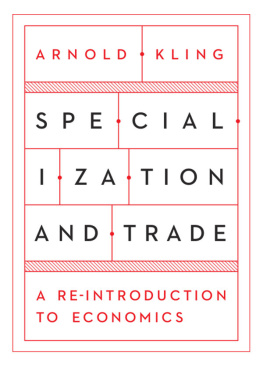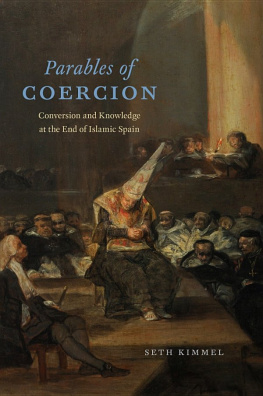David W. Kling - A History of Christian Conversion
Here you can read online David W. Kling - A History of Christian Conversion full text of the book (entire story) in english for free. Download pdf and epub, get meaning, cover and reviews about this ebook. year: 2020, publisher: OUP Premium, genre: Religion. Description of the work, (preface) as well as reviews are available. Best literature library LitArk.com created for fans of good reading and offers a wide selection of genres:
Romance novel
Science fiction
Adventure
Detective
Science
History
Home and family
Prose
Art
Politics
Computer
Non-fiction
Religion
Business
Children
Humor
Choose a favorite category and find really read worthwhile books. Enjoy immersion in the world of imagination, feel the emotions of the characters or learn something new for yourself, make an fascinating discovery.
- Book:A History of Christian Conversion
- Author:
- Publisher:OUP Premium
- Genre:
- Year:2020
- Rating:4 / 5
- Favourites:Add to favourites
- Your mark:
- 80
- 1
- 2
- 3
- 4
- 5
A History of Christian Conversion: summary, description and annotation
We offer to read an annotation, description, summary or preface (depends on what the author of the book "A History of Christian Conversion" wrote himself). If you haven't found the necessary information about the book — write in the comments, we will try to find it.
A History of Christian Conversion — read online for free the complete book (whole text) full work
Below is the text of the book, divided by pages. System saving the place of the last page read, allows you to conveniently read the book "A History of Christian Conversion" online for free, without having to search again every time where you left off. Put a bookmark, and you can go to the page where you finished reading at any time.
Font size:
Interval:
Bookmark:


Oxford University Press is a department of the University of Oxford. It furthers the Universitys objective of excellence in research, scholarship, and education by publishing worldwide. Oxford is a registered trade mark of Oxford University Press in the UK and certain other countries.
Published in the United States of America by Oxford University Press
198 Madison Avenue, New York, NY 10016, United States of America.
Oxford University Press 2020
All rights reserved. No part of this publication may be reproduced, stored in a retrieval system, or transmitted, in any form or by any means, without the prior permission in writing of Oxford University Press, or as expressly permitted by law, by license, or under terms agreed with the appropriate reproduction rights organization. Inquiries concerning reproduction outside the scope of the above should be sent to the Rights Department, Oxford University Press, at the address above.
You must not circulate this work in any other form and you must impose this same condition on any acquirer.
Library of Congress Cataloging-in-Publication Data
Names: Kling, David William, 1950 author.
Title: A history of Christian conversion / David W. Kling.
Description: New York : Oxford University Press, [2020] |
Includes bibliographical references and index.
Identifiers: LCCN 2019057694 (print) | LCCN 2019057695 (ebook) |
ISBN 9780195320923 (hardback) | ISBN 9780199910922 (ebook) |
ISBN 9780190062620 (online)
Subjects: LCSH: ConversionChristianityHistory. |
Christian convertsHistory. | Church history.
Classification: LCC BV4916.3 .K55 2020 (print) |
LCC BV4916.3 (ebook) | DDC 248.2/409dc23
LC record available at https://lccn.loc.gov/2019057694
LC ebook record available at https://lccn.loc.gov/2019057695
Unless otherwise noted or within a quoted source, all Scripture quotations contained herein are from the New Revised Standard Version Bible, copyright 1989, Division of Christian Education of the National Council of Churches of Christ in the United States of America. Used by permission. All rights reserved.
is largely reproduced from David W. Kling, Conversion to Christianity, in The Oxford Handbook of Religious Conversion, ed. Lewis R. Rambo and Charles E. Farhadian (New York: Oxford University Press, 2014), 598631. Used by permission. All rights reserved.
Portions of the section, Luther and Conversion () are drawn from David W. Kling, The Bible in History: How the Texts Have Shaped the Times (New York: Oxford University Press, 2004), 13037. Used by permission. All rights reserved.
Once again, to Barbara
I have lived with Christian conversion all of my life. I have witnessed it, heard testimonies of it, studied it, and written articles and monographs about it, and now, to realize my lifelong interest in the topic, I offer a book that examines its history. I seek to address two basic questions: What is conversion, and under what circumstances do people become Christians? Although conversion is often associated with a particular strand of modern Christianity (evangelical) and a particular type of experience (a sudden, shattering, complete event), it is, when examined over two millennia, a phenomenon far more complex than any one-dimensional profile would suggest.
To be sure, there are those who find any reference to Christian conversion problematic. Some prefer the terms religious change or religious transformation to conversion, ostensibly to avoid the totalizing, triumphalist notions implicitly embedded in the word. For others, conversion implies the forceful efforts (whether physical or verbal) by zealous believers to impose their faith on others. In their minds, conversion to Christianity is a colonization of consciousness, conjuring up images of crusading armies, inquisitions, religious wars, white mans religion, colonialism, imperialism, and present-day fundamentalisms. These aspects of Christian history cannot be discounted or glossed over. But if they remain the only focus of attention, then they vastly distort the larger picture. To cite evidence from the last half-century, the unanticipated and largely overlooked Christian resurgence in the non-West has been a postcolonial, local, and indigenous phenomenon, largely independent of Western missionary influence. The transmission and diffusion of Christianity has rarely been a one-sided affair, impressed upon passive or solely reactive agents. Millions of people have embraced the Christian faith not because of threat or coercion nor because a colonial power imposed Christianity upon them but because of a variety of inducements and motivations, including the intrinsic appeal of the Christian message itself. They concluded that the Christian God was the true God and the only God that was capable of helping and/or saving them, both in the temporal world and the life to come.
My working premise is one that historians assume: change is a constant. As one of the worlds faiths that has known long-term success, Christianity has shown a remarkable ability to adapt and mutate over its 2,000-year history. It necessarily follows, then, that the process, understanding, experience, and content of conversion vary over time and place. Conversion looks different under different historical circumstances, and, even within the very same historical context, the subjects of conversion may disagree among themselves as to what constitutes true conversion. From my working premise, I propose the following working thesis: the way in which conversion occurs and is expressed illumines the distinctive characteristics of Christianity in any given period.
There has been no lack of modern scholarly interest in the subject of conversion. The normal point of departure in a review of the literature is found in the classic works of the psychologist William James (1901) and the historian of ancient religions A. D. Nock (1933), followed by social scientific studies in the 1970s and 1980s that explore the rise of new religious movements (cults) and by historical treatments of Protestant revivals and awakenings. Since the 1970s, with attention given to Christianitys role in globalization and its enduring presence in postcolonial environments, Christian conversion
Why then another work on Christian conversion? Despite the growing literature, a contextually sensitive, historical, and thematic survey of the Christian conversion does not exist. In his influential 1993 study, Understanding Religious Conversion, Lewis Rambo concluded that one critical topic for further research was a study of the systematic history of conversion in the development of religions. My hope is that I have chosen regions, groups, and individuals that are representative of the far-flung geographical extent of Christianity. I have favored selectivity and depth over breadth and generalityalbeit with the admission that these are relative terms. Second, autobiographical. Although I do discuss numerous individual accounts of conversion, I do not address many well-known Christian conversions (e.g., those of Blaise Pascal, John Henry Cardinal Newman, Thomas Merton, Bakht Singh Chabra). Undoubtedly, the latter have their place in the Christian converts hall of fame, but the aggregate of these well-known individuals does not a history of conversion make. Peoples, groups, and movements must have their place as well. Third, interreligious. Although I have given some attention to the interactions between Christianity and other major religions in the conversion process, I have not given them sustained attention throughout. While it is true that the greatest numerical gains in Christian converts have taken place among adherents of primal or primary religions (a substratum of religions that underlie all other religions), since its beginnings in Judaism, Christianity has invariably encountered other religions whose presence has shaped the conversion process. Whether hostilely resistant or mildly open to Christianity, these religions have ineluctably shaped both the possibility of and the distinct character of Christian conversion. Finally, theological. I do engage theology and mission studies (missiology)both figure significantly in the history of Christian conversionbut this is neither a book on the theology of conversion nor a history of missions.
Font size:
Interval:
Bookmark:
Similar books «A History of Christian Conversion»
Look at similar books to A History of Christian Conversion. We have selected literature similar in name and meaning in the hope of providing readers with more options to find new, interesting, not yet read works.
Discussion, reviews of the book A History of Christian Conversion and just readers' own opinions. Leave your comments, write what you think about the work, its meaning or the main characters. Specify what exactly you liked and what you didn't like, and why you think so.

